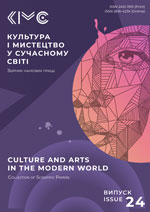Promoting, Developing, and Preserving: Using Performance Award Graded Examinations to Encourage the Performance of Welsh Traditional Music on the 16-String Small Harp
DOI:
https://doi.org/10.31866/2410-1915.24.2023.287667Keywords:
Intangible Cultural Heritage, Assessment, Welsh Music, Traditional Music, Music Examinations, HarpAbstract
The aim of this article as a research paper is to present the initial approach of an action research project undertaken digitally between the International School of Musicians and Derwent Harp School, a collaboration between two neighbouring countries, England and Wales. The ongoing project aims to develop and promote the use of Welsh traditional music through the International School of Musicians graded examination syllabus for the small 16-string Harp in C major. Derwent Harp School, a Welsh Music School, has compiled the music for the syllabus from their extensive knowledge of both small harp and Welsh traditional music. The harps are hand-made from wood in Wales by Derwent Harps. The action research methodology details the first cycle of research results and recommendations for further research cycles to be conducted. The research involved two specialised harp teachers, five examination candidates and one examiner. Data was collected through semi-structured interviews, which were analysed using thematic and narrative analysis. The initial results show a positive outcome in the uptake of Welsh traditional music, with candidates expressing a keenness to learn additional Welsh traditional music and seeking opportunities to explore the range of music available. The practical significance of the action research stems from the decline in instrumental tuition in Wales, specifically that of Welsh traditional music. Furthermore, the research makes a beginning contribution to science by investigating current practices in teaching instrumental music tuition in Wales, which is currently an under-researched area. Initial Conclusions suggest the use of the graded music exam as a means to promote Welsh traditional music is well placed to make an impact on improving uptake by promoting, developing and maintaining this genre for future generations.
References
Bonfield-Brown, J. (2018). The Assessment of Musical Attainment: Acquiring Cultural Capital and Building Learning Power in Instrumental Music Tuition [Doctoral Dissertation, Nottingham Trent University]. http://irep.ntu.ac.uk/id/eprint/38927/ [in English].
Bradbury-Huang, H. (2010). What is good action research? Why the resurgent interest? Action Research, 8(1), 93–109. https://doi.org/10.1177/1476750310362435 [in English].
Carr, P. (2018). International Best Practice in Music Performance Education Models and Associated Learning Outcomes for Wales. The University of South Wales [in English].
Cohen, L., Manion, L., & Morrison, K. (2007). Research methods in education (6th ed.). Routledge. https://doi.org/10.4324/9780203029053 [in English].
Culture, Welsh Language and Communications Committee. (2018). Hitting the Right Note: Inquiry into funding for and access to music education. National Assembly for Wales. https://senedd.wales/laid%20documents/cr-ld11595/cr-ld11595-e.pdf [in English].
Kemmis, S. (1993). Action Research. In M. Hammersley (Ed.), Educational research: Current issues (Vol. 1, pp. 177–190). Paul Chapman [in English].
Kim, J.-H. (2016). Understanding narrative inquiry: The crafting and analysis of stories as research. Sage. https://doi.org/10.4135/9781071802861 [in English].
Kinney, P. (2011). Welsh Traditional Music. University of Wales Press [in English].
Kurin, R. (2004). Safeguarding intangible cultural heritage in the 2003 UNESCO Convention: A critical appraisal. Museum International, 56(1–2), 66–77. https://doi.org/10.1111/j.1350-0775.2004.00459.x [in English].
Lewin, K. (1946). Action Research and Minority Problems. Journal of Social Issues, 2(4), 34–46. http://doi.org/10.1111/j.1540-4560.1946.tb02295.x [in English].
Lewis, J. (2013). A Cross-Cultural perspective on the significance of music and dance to culture and society. In M. A. Arbib, (Ed.), Language, music, and the brain: A mysterious relationship (Vol. 10, pp. 45–65). MIT Press. https://doi.org/10.7551/mitpress/9780262018104.003.0002 [in English].
Nettl, B. (2000). An ethnomusicologist contemplates universals in musical sound and musical culture. In N. L. Wallin, B. Merker, & S. Brown (Eds.), The origins of music (pp. 463–472). MIT Press [in English].
Polkinghorne, D. E. (1988). Narrative knowing and the human sciences. State University of New York Press [in English].
Schwab, K. (2017). The Fourth Industrial Revolution. Portfolio Penguin [in English].
Southcott, J. (2017). Examining Australia: The Activities of four examiners of the Associated Board for the Royal Schools of Music in 1923. Journal of Historical Research in Music Education, 39(1), 51–77. http://doi.org/10.1177/1536600617709543 [in English].
UNESCO. (2018). Basic texts of the 2003 Convention for the safeguarding of the intangible cultural heritage. Living Heritage Culture Sector. https://ich.unesco.org/doc/src/2003_Convention_Basic_Texts-_2018_version-EN.pdf [in English].
United Nations. (2020). The impact of digital technologies. https://www.un.org/en/un75/impact-digital-technologies [in English].
Wright, D. C. H. (2013). The Associated Board of the Royal Schools of Music: A social and cultural history. Boydell Press [in English].
Downloads
Published
How to Cite
Issue
Section
License

This work is licensed under a Creative Commons Attribution 4.0 International License.
Authors who publish in this journal agree to the following terms:
1) The authors reserve the right to the authorship of their work and transfer to the journal the right to first publish this work under the terms of the Creative Commons Attribution License, which allows others to freely distribute the published work with a mandatory reference to the authors of the original work and the first publication of the work in this journal.
2) The authors have the right to enter into independent additional agreements for non-exclusive distribution of the work in the form in which it was published by this journal (for example, to place the work in the electronic repository of the institution or to publish it as part of a monograph), provided that the reference to the first publication of the work in this journal is maintained.
3) The journal's policy allows and encourages authors to post their manuscripts on the Internet (for example, in institutional repositories or on personal websites) both before submitting the manuscript to the editorial board and during its editorial processing, as this contributes to the emergence of a productive scientific discussion and has a positive effect on the efficiency and dynamics of citation of published work (see The Effect of Open Access).






